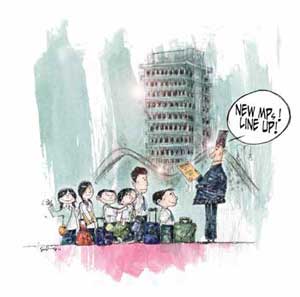The first test for the coalition will come when the electoral boundaries are redrawn to create new parliamentary and state seats to accommodate the increasing population.
by V. Vasudevan, NEW SUNDAY TIMES
 One shot to fame recording a lawyer allegedly brokering judiciary appointments; another a human rights activist and there is one who has been a regular demonstrator. They are first-time members of Parliament who will be on the opposition bench when the 12th Malaysian Parliament convenes on April 28, writes V. VASUDEVAN
One shot to fame recording a lawyer allegedly brokering judiciary appointments; another a human rights activist and there is one who has been a regular demonstrator. They are first-time members of Parliament who will be on the opposition bench when the 12th Malaysian Parliament convenes on April 28, writes V. VASUDEVAN
THERE will be no shortage of colourful characters, and possibly fireworks, when Parliament sits for the first time following the wind of change to the Malaysian political landscape after the general election on March 8.
Gone are the stalwarts who have been swept aside by a disenchanted electorate and their places will be taken up by a plethora of unknowns, fledgling politicians and journeymen.
Take for instance Loh Gwo Burne, the MP from Kelana Jaya. To say he is an accidental politician would be a disservice to him. But Loh, thrust into the limelight as the person behind the now infamous Lingam videotape which cast a pall over judiciary appointments, stood on a PKR ticket and won against the ubiquitious Datuk Lee Hwa Beng for the Kelana Jaya seat.
Two others who will be making their debut in the august House are human rights activist R. Sivarasa (Subang) and Tian Chua (Batu).
Chua, particularly, has been a prominent figure in many demonstrations against the establishment. Now that he is an MP, he is expected to add zest and colour to the daily proceedings in parliament.
Apart from these newcomers, there are a few on the comeback trail such as Pas veteran Mahfuz Omar , who had lost in the 2004 election but is now back as MP for Pokok Sena.
Also returning as MP is former Umno strongman Datuk Ibrahim Ali, who won Pasir Mas on a Pas ticket this time.
Barisan Nasional may have lost its two-thirds majority -- it won 90 per cent of the 219 seats in the 2004 election -- but it is still very much in control of parliament, holding 140 of the 222 seats, with old hands like the irrepressible Datuk Mohamad Aziz and Datuk Bung Moktar Radin to to ensure that there will never be a dull moment.
This is the second time that the ruling coalition has lost its two-thirds majority, the last being in the 1969 general election.
The opposition made inroads this time with 82 seats, bolstered by a number of fiery personalities such as DAP's female trio of Chong Eng (Bukit Mertajam), Fong Po Kuan (Batu Gajah) and Teresa Kok (Seputeh) and a new "sister" from Serdang, Teo Nie Ching.
Teo made it to parliament on the back of her oratory skills during the election campaign.
The 12th parliament will also see a record number of 10 Indian MPs from PKR and DAP. Apart from Sivarasa, they are Karpal Singh (Bukit Gelugor), N. Gobalakrishnan (Padang Serai), P. Ramasamy (Batu Kawan), Dr Michael Jeyakumar (Sungai Siput), M. Kulasegaran (Ipoh Barat), M. Manogaran (Teluk Intan), Gobind Singh (Puchong) and S. Manikavasagam (Kapar).
The DAP can boast of two father-and-son team of MPs -- Karpal and Gobind; Lim Kit Siang and Guan Eng -- while PKR has a mother-daughter tandem of Datin Seri Wan Azizah Wan Ismail (Permatang Pauh) and Nurrul Izzah (Pantai).
There will also be two brothers in the House, but sitting on opposite sides of the aisle -- BN's Datuk Shahrir Abdul Samad (Johor Baru), who is domestic trade and consumer affairs minister, and his younger brother from Pas, Khalid Abdul Samad (Shah Alam).
There are familiar faces, too, but in different camps this time. Several former Umno office bearers who contested and won under the PKR banner are former Selangor deputy menteri besar Datuk Dr Zainal Abidin Ahmad (Hulu Langat), former Umno Youth secretary Saifuddin Saifuddin Nasution Ismail (Machang) and PKR vice-president Mohamed Azmin Ali (Gombak), private secretary to Datuk Seri Anwar Ibrahim when he was in BN.
New faces or not, what does the scenario entail for BN in parliament?
In real terms, BN, which forms the federal government, can enact laws but will not be able to amend the constitution without support from the opposition.
The first test for the coalition will come when the electoral boundaries are redrawn to create new parliamentary and state seats to accommodate the increasing population.
Over the years, the opposition has cried foul over what it claimed as BN gerrymandering. Now, with a vastly increased representation, the opposition front, now known as Pakatan Rakyat, is expected to have a stronger say during debate on such issues.
Among the opposition parties, PKR has made the biggest gains, winning 31 seats compared to one in 2004. DAP has 28 and Pas 23.
In total, there are 99 first-time MPs, comprising about 40 per cent in the 222-seat House.
Indeed, it's a new dawn for parliamentarians. No doubt, scrutiny from the rakyat who put them will never be more intense.

No comments:
Post a Comment